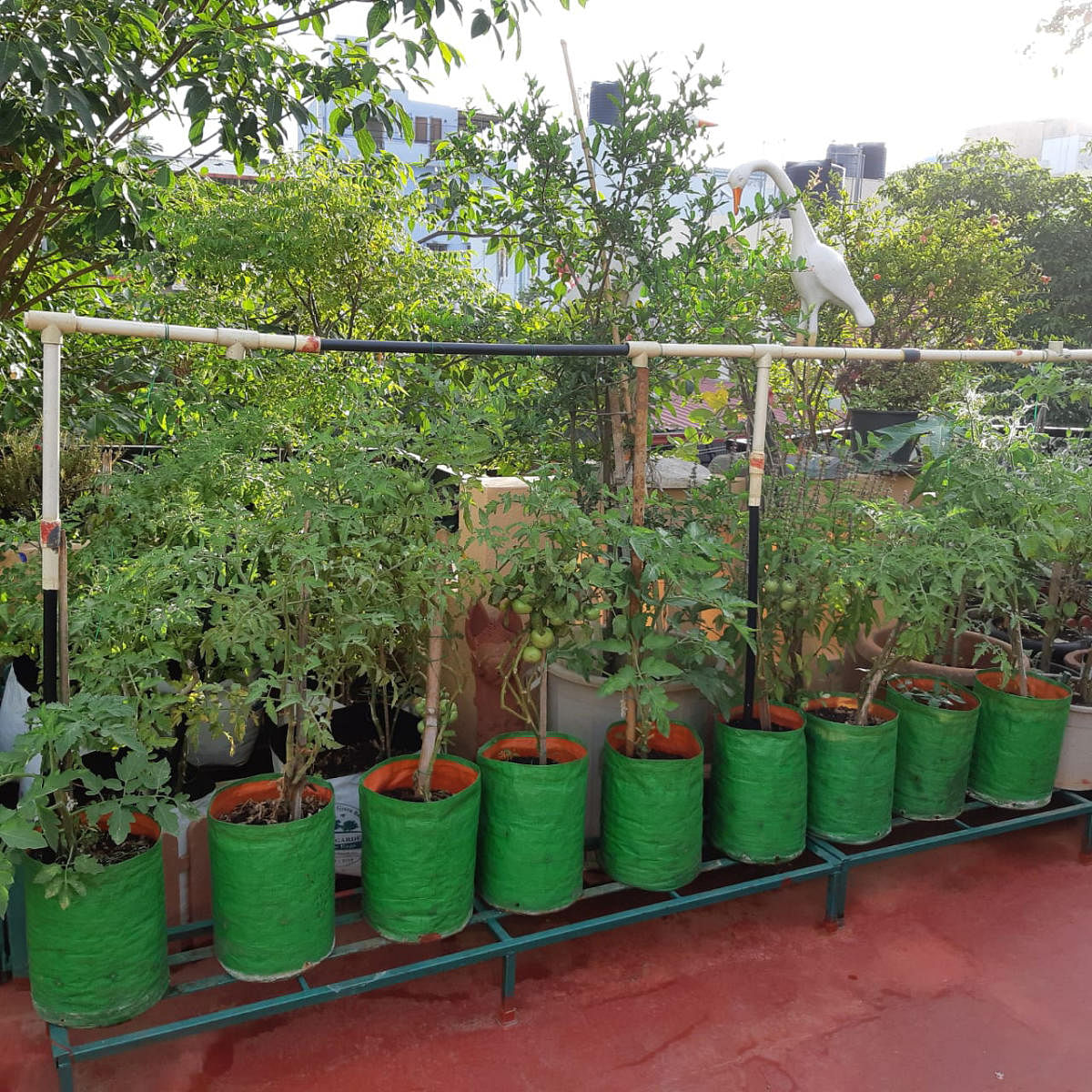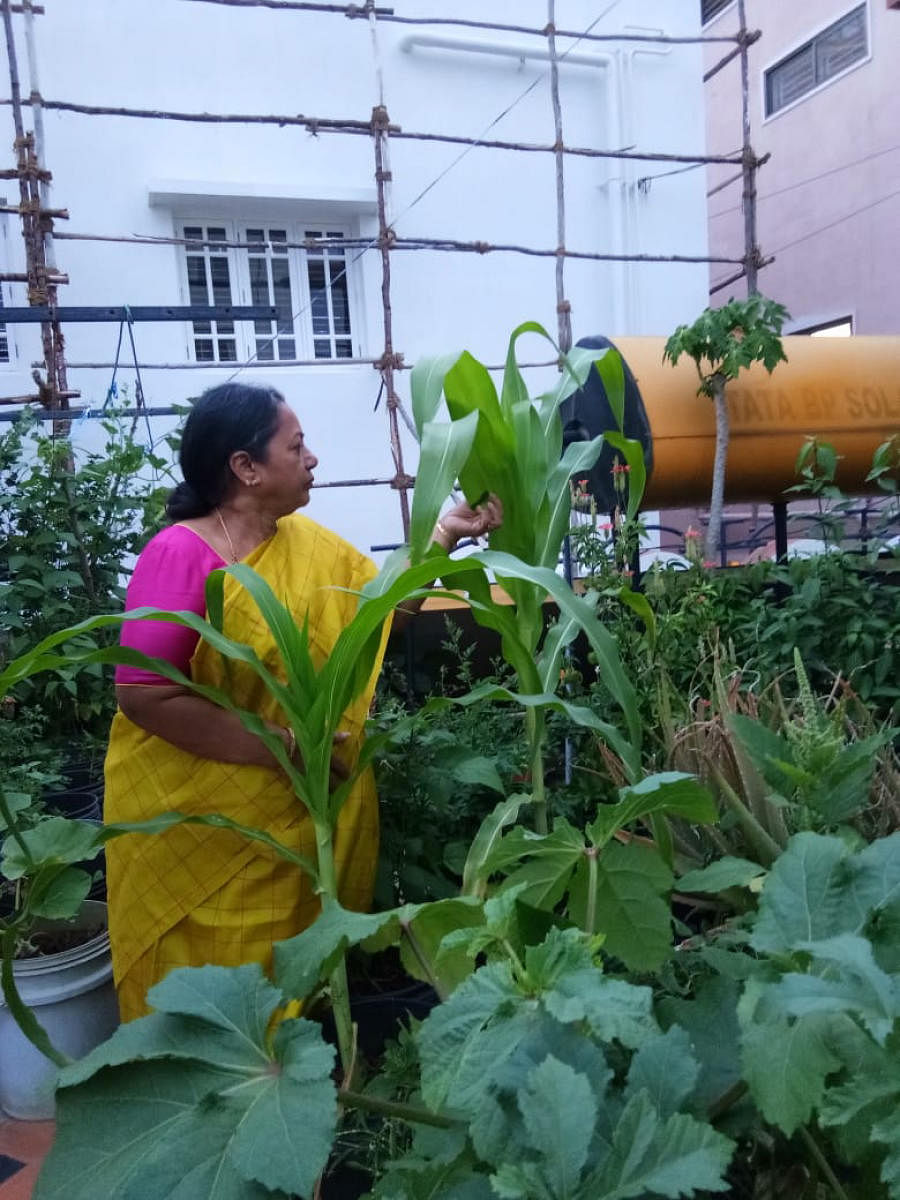

Wasps have built a nest in Latha Raghavendra’s terrace garden in J P Nagar, Bengaluru. As her son tends to the garden daily during lockdown, she seeks out an expert to know if the nest is harmful and should go.
Agricultural scientist and entomologist Rajendra Hegde receives at least 6-8 such queries every day on social media and by calls, a sign, he says, that terrace gardening has gained momentum in the past couple of months.
Some 50,000 urban farmers in Bengaluru now primarily grow vegetables, fruits, greens and medicinal plants.
Terrace gardening found its roots in the city 25 years ago, when veteran entomologist and agricultural scientist Dr B N Vishwanath saw the opportunity in using terraces as farming space to expand green cover within the grey urban milieu.
“His idea grew into the NGO Garden City Farmers that has been promoting a safe urban food scape on the principle ‘eat what you grow and grow what you eat’. There are seminars and workshops, about 100 a year, that tells people about the advantages of organic terrace gardening and guides them practically. The OFYT (Oota From Your Thota) is an exhibition organised every three months in the city for enthusiasts and amateurs to get started or buy materials required for terrace gardening,” adds Hegde, also part of the NGO.
Nagendra Bachulal, 37, attended one such workshop and now has turned his small garden into a full-fledged one on his terrace in BTM layout, as his IT job allows him to work from home. “I can concentrate on gardening. I grow fruits, lemons, amla, and a lot of greens like methi and palak. It serves my family of five twice a week,” he says.
“We don’t know the source of food. Gardening helps me see how food is grown. I’ve realised natural fertilisers are enough for a good harvest. It’s satisfying to eat hygienic food. Plus, composting wet waste reduces the stress on Bengaluru’s waste management,” he adds.
Tejaswini Ananth Kumar, another terrace gardener and Chairperson of the NGO Adamya Chetana, concurs. “There’s a small bio-gas plant on the terrace and I’ve started operating it myself since the lockdown. It minimalises the household’s waste output. And, with my produce, I don’t have to visit markets for vegetables for the most part,” she explains.
For Uma Raji, a few minutes of interaction with her terrace and balcony gardens is enough to keep her fresh all day. It’s needed especially when, as a corona warrior, she cooks meals between 3 and 6 am every day, spearheading her initiative called Team Aadya.
Terrace gardening paves way for humans to grow with nature in between the monstrous urban growth, believes Indira Ashok Shah, a terrace gardener since 1982.
She relies little on market produce, with even a coffee plant on her terrace garden, along with mango and papaya trees, flowers, and a long list of greens, and exotic and medicinal plants among the diverse produce.
Her garden transforms into a picnic spot and classroom for her five-year-old and two-year-old grandchildren. “We go to the garden every evening with juice and snacks. I introduce them to my plants, teach them how to sow seeds... That’s how young ones learn. They are about to sow halasande kaalu,” she beams.
The terrace gardeners exchange tips or simply showcase their day’s produce on chat groups. “The Uttarahalli Terrace Gardeners also arranges expert talks on urban gardening,” adds Shah. On normal days, the groups facilitate seed exchange, too. In place of the broken supply chain now, some groups have started connecting farmers directly to consumers.
In the absence of on-ground workshops, Rajendra Hegde now and then conducts Live sessions on social media to impart gardening lessons in both English and Kannada.
“Fifty percent of the queries are about ‘pest’ management. Squirrels eating away hibiscus plants, about ant and termite colonies etc. People want to know how they can get rid of them. Urban gardening is built on plant protection than killing of insects. Interventions like home-made sprays, right urban plant nutrients and regular scouting for insect colonies, eggs etc help in this regard,” Hegde makes clear.
Did Latha Raghavendra smoke out the wasps from the nest after all?
“No, I couldn’t bring myself to. We let them be.”